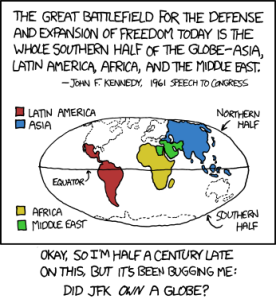For those of you who read The World Is Flat by Thomas Friedman, globalization is great. Nothing but good can come from networks that span continents and connect disparate populations together – to make money, of course. For the most popular example, take a look at InfoSys. “Win in the flat world” indeed. But if they’re winning, then who’s losing?
As it turns out, we all are a little. Networks spanning continents, connecting disparate populations together sounds suspiciously similar to….terrorists networks. Yeah. Social media and the new tools of the globalized, flat, market are just as useful to groups like Al-Qaeda. So I was very amused to find an article here in The Times that acted as though it were really that shocking the way these small, tightly-knit terrorist organizations around the world are multiplying and extending their influence. Really? Is it that shocking that the Shabaab can connect, download, upload, meet up and cause a stir across borders?

It is and it isn’t. But the world isn’t flat – it’s bumpy, it’s far away, and it’s curved, meaning that we don’t always see the effect of our decisions. Our actions (as a government) have consequences today that they may not have yesterday, or a year ago, or an era before. In an interconnected system, a good offense is not a good defense – it’s a good way to get our country tangled up in a whole lot of trouble. That is what happened in Somalia and Somaliland.
As for people at the individual scale working with social media, I’m not sure that Obama solicits foreign policy advice from his Facebook page.
